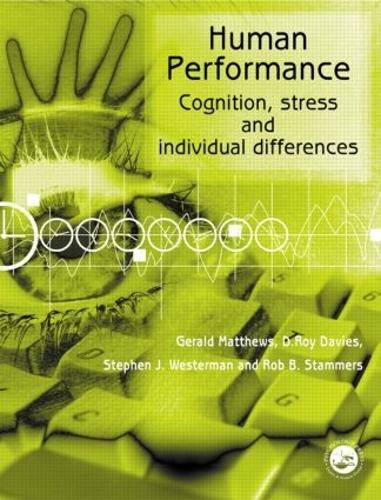Overview
Provides the student and researcher with a comprehensive and accessible review of performance, the real world and essential cognitive science theory. Four sections cover both theoretical and practical issues: Section One outlines the perspectives on performance offered by contemporary cognitive science, including information processing and neuroscience perspectives. Section Two presents a multi-levelled view of the performer as biological organism, information-processor and intentional agent. It reviews the development of the cognitive theory of performance through experimental studies and also looks at practical issues such as human error. Section Three reviews the impact of stress factors on performance such as noise, fatigue and illness. Section Four assesses individual and group differences in performance with accounts of ability, personality and ageing.
Full Product Details
Author: D. Roy Davies ,
Gerald Matthews ,
Rob B. Stammers ,
Steve J. Westerman
Publisher: Taylor & Francis Ltd
Imprint: Psychology Press Ltd
Dimensions:
Width: 18.90cm
, Height: 2.10cm
, Length: 24.60cm
Weight: 0.840kg
ISBN: 9780415044073
ISBN 10: 0415044073
Pages: 416
Publication Date: 24 August 2000
Audience:
College/higher education
,
Tertiary & Higher Education
,
Undergraduate
Format: Paperback
Publisher's Status: Active
Availability: In Print

This item will be ordered in for you from one of our suppliers. Upon receipt, we will promptly dispatch it out to you. For in store availability, please contact us.
Reviews
'It was a pleasure to read this book. It deals with relatively complex subject matter in an easy-to-read, practical style. It is evident that the authors have an underlying desire to inform rather than impress, yet the book is impressive because of their approach. I would recommend this book as essential reading for any psychology student or professional working in the field.' - Ergonomics Abstracts 'Matthews and his fellow authors have done an excellent job of providing the reader with well-informed and thought-provoking accounts of the current state of knowledge with respect to the ways in which numerous stressors influence human cognition and performance. That is a significant achievement given the substantial research literature that has built up with respect to many of the findings.' - Contemporary Psychology: An American Psychological Association journal
Human Performance is the answer to my quest for a theoretically based applied psychological text.I found the text well written and difficult to put down.. <br>-Professor Neville Stanton, Brunel University <br>... [A] useful and significant text.. <br>-Dr. Jan Noyes, University of Bristol <br> The text is ideally suited to the undergraduate market and students will benefit from the clarity of the exposition, coverage of relevant theory and recommendations for further reading.. <br>-Dr. Kav Vedhara, University of Bristol <br>
'It was a pleasure to read this book. It deals with relatively complex subject matter in an easy-to-read, practical style. It is evident that the authors have an underlying desire to inform rather than impress, yet the book is impressive because of their approach. I would recommend this book as essential reading for any psychology student or professional working in the field.' - Ergonomics Abstracts 'Matthews and his fellow authors have done an excellent job of providing the reader with well-informed and thought-provoking accounts of the current state of knowledge with respect to the ways in which numerous stressors influence human cognition and performance. That is a significant achievement given the substantial research literature that has built up with respect to many of the findings.' - Contemporary Psychology: An American Psychological Association journal
'It was a pleasure to read this book. It deals with relatively complex subject matter in an easy-to-read, practical style. It is evident that the authors have an underlying desire to inform rather than impress, yet the book is impressive because of their approach. I would recommend this book as essential reading for any psychology student or professional working in the field.' - Ergonomics Abstracts<br><br>'Matthews and his fellow authors have done an excellent job of providing the reader with well-informed and thought-provoking accounts of the current state of knowledge with respect to the ways in which numerous stressors influence human cognition and performance. That is a significant achievement given the substantial research literature that has built up with respect to many of the findings.' - Contemporary Psychology: An American Psychological Association journal
Author Information
Gerald Mathews is Associate Professor in Psychology at the University of Cincinnati. D. Roy Davies is Reader in Experimental Psycholgy at Aston University. Stephen J. Westerman is a lecturer at the Psycholgy Institute at Aston university. Rob B. Stammers is the Professor of Occupational Psychology at Leicester University.




